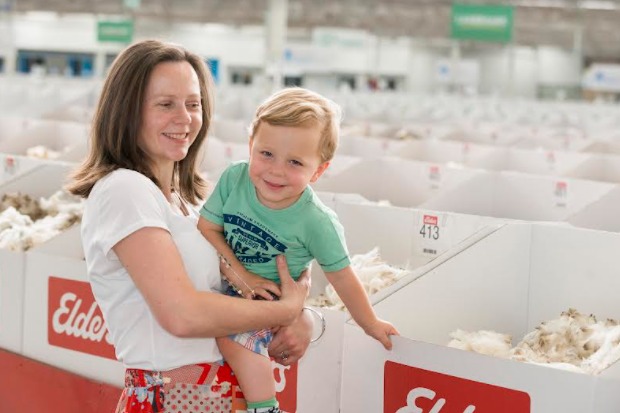
Claire Hausler holding son Jack Johnson at the Wool Selling Centre in Melbourne. Photo – Barrie Turpin.
MERINEO founder Claire Hausler has invoked Women In Wool to use their power as consumers to urge retailers to stock woollen garments.
At the annual WIW virtual conference last Friday, the Victorian baby wear manufacturer said she started Merineo five years ago with a 17 micron Merino wool newborn swaddle bag that was successfully trialled at a maternity hospital in Melbourne.
The Merineo range now includes a baby sleeping bag and clothing. The 100 percent superfine Merino swaddle bag is one of six finalists in the in the textile or fashion design category of the Victorian Premier’s Design Awards.
When her first baby, Jack, was born six years ago, Claire said she became frustrated with the use of cotton and nylon in baby clothes rather than wool.
She told how supporting midwife feedback for the 17 micron swaddle bag was overwhelming and a “huge relief” and helped her place her product in hospitals.
“But it made me realise that we had to educate parents about wool.”
She developed an educational brochure and then was encouraged by Australian Innovation-funded research by Associate Professor John Su from Monash University and the Murdoch Children’s Research Institute that showed using 17.5 micron alleviated eczema symptoms.
Claire launched her product on social media, but then had to overcome negative comments about wool on the Raising Children Network website. She said the Australian Government-funded website was regarded as a “go to” contact point for mothers, but it stated that wool is a cause of eczema and to “avoid using wool to treat eczema”.
She said the website was probably looked at by 100,000 mothers per year with eczema-affected babies, because about one third of the 300,000 babies born in Australia annually suffer from the condition.
“This deeply concerned me because not only did I have all these products that I needed to sell, and I was trying to promote them as being useful for treating child eczema, but I was worried because people were being told the wrong thing.”
Claire contacted the network two years ago, sent copies of Associate Professor Su’s research results and despite follow-ups didn’t hear anything back.
However, while preparing for her presentation on Friday she noticed that the statements about wool and eczema had been removed from the RCN website. The website now says that some of the triggers for eczema are “irritating fabrics like coarse-fibred wool and polyester.”
“So now we no longer have 100,000 people at least looking at that and reading it.”
“If you see something incorrect, you can actually change it,” she said.
Claire said is now starting to survey baby retail shops and last week went into a national chain store in Hawthorn last week to ask what they have in Merino wool in their ranges.
“And they had nothing, other than an underlay for a cot.”
She was told the main reasons for not stocking woollen products were price point and lack of awareness. Claire encouraged the WIW participants to ask for Merino wool products when they were shopping to “plant that seed’ for the retailers to do their research.
“The voice of the consumer is critical,” she said.
“It’s about getting out in your community, talking amongst your network and making wool part of your day-to-day conversation.”
WIW moderator Bianca Heaney said the industry needed to tell its story.
Australian Association of Stud Merino Breeders secretary Sally Hicks said she knew of a school that had bought new “soft wool” jumpers that were not soft wool. After several complaints, the school then went with jumpers made from recycled plastic bottles, despite her efforts to highlight the environmental benefits of garments made from finer Merino wool.



HAVE YOUR SAY